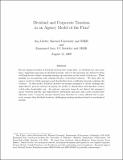| dc.contributor.author | Chetty, Raj | |
| dc.contributor.author | Saez, Emmanuel | |
| dc.date.accessioned | 2012-10-16T14:50:12Z | |
| dc.date.issued | 2010 | |
| dc.identifier.citation | Chetty, Raj, and Emmanuel Saez. 2010. Dividend and corporate taxation in an agency model of the firm. American Economic Journal: Economic Policy 2(3): 1–31. | en_US |
| dc.identifier.issn | 1945-7731 | en_US |
| dc.identifier.uri | http://nrs.harvard.edu/urn-3:HUL.InstRepos:9748526 | |
| dc.description.abstract | Recent evidence on the effect of dividend taxes on firm behavior is inconsistent with neoclassical theories of dividend and corporate taxation. We develop a simple agency model in which managers and shareholders have conflicting interests to explain the evidence. In this model, dividend taxation induces managers to undertake unproductive investments by retaining earnings, and creates a first-order deadweight cost. In contrast, corporate taxes do not distort the manager's payout decision and may only create second-order efficiency costs. Corporate income taxation may therefore be a more efficient way to generate revenue than dividend taxation, challenging existing intuitions based on neoclassical models | en_US |
| dc.description.sponsorship | Economics | en_US |
| dc.language.iso | en_US | en_US |
| dc.publisher | American Economic Association | en_US |
| dc.relation.isversionof | doi:10.1257/pol.2.3.1 | en_US |
| dash.license | OAP | |
| dc.subject | firm behaviour | en_US |
| dc.subject | payout policy | en_US |
| dc.subject | fiscal policies and behavior of economic agents | en_US |
| dc.subject | business taxes and subsidies including sales and value-added (VAT) | en_US |
| dc.title | Dividend and Corporate Taxation in an Agency Model of the Firm | en_US |
| dc.type | Journal Article | en_US |
| dc.description.version | Accepted Manuscript | en_US |
| dc.relation.journal | American Economic Journal: Economic Policy | en_US |
| dash.depositing.author | Chetty, Raj | |
| dc.date.available | 2012-10-16T14:50:12Z | |
| dc.identifier.doi | 10.1257/pol.2.3.1 | * |
| dash.contributor.affiliated | Chetty, Raj | |


